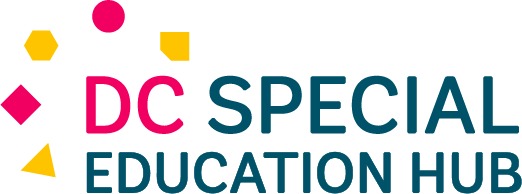 Behavioral Supports
Behavioral Supports
All students benefit from behavioral supports, systems, and routines in school. However, some special education students may require a bit more support to promote healthy behaviors.
How Can My Child Receive Behavioral Supports Through Their IEP (Individualized Education Program)?
Students with disabilities can qualify for Behavioral Support Services (BSS) and Emotional, Social, and Behavioral Development goals on their IEP. Just like an academic area of concern, including Emotional, Social, and Behavioral Development goals is a data-based team decision.
Qualifying students then receive Behavior Support Services (BSS) for a set number of hours per month through any of the following methods:
- Inside the General Education Setting: A mental health professional will support your child inside their regular class.
- Outside the General Education Setting: A mental health professional will pull your child from their regular class or activity for individual or group BSS sessions.
- Consultation: A mental health professional will not meet with your child directly, but they will consult with your child’s teachers about the best strategies and supports to implement to support their behavior.
BSS can support students with a wide range of challenges, including executive functioning, self-regulation, emotion-identification, mental health concerns, and more.
How Can My Child Receive Behavioral Supports Outside of Their IEP?
While IEPs can provide useful support, some students require more in the form of a Behavior Intervention Plan (BIP). A BIP creates a clear, actionable plan to support your student’s school team in helping to minimize a target behavior. BIPs are developed through collaboration between you, your child, and the school team and include:
- A Description of the Target Behavior (ex. “Leaving the classroom without permission”)
- The Function of the Target Behavior: Why does the child engage in this behavior? (ex. social attention or task avoidance)
- Prevention Strategies: What can the team do prevent this behavior? (ex. previewing non-preferred assignments or positively narrating student actions)
- Replacement Behavior: What should the student do instead of the target behavior? (Note: this must serve the same function as the target behavior.)
It is important to note that BIPs are not a special education service - they are tools available for all students, regardless of ability/disability status.
I Heard That I Should Ask for a Functional Behavioral Assessment (FBA). What is That?
An FBA is a process schools use to determine why a student is demonstrating a challenging behavior. Through a process of data collection (ex. Examining school records, interviewing staff or the student, screeners, etc.) a team, typically led by a school psychologist, behavior specialist, or other mental health professional determines the function of the challenging behavior.
This function may be to get social attention, access tangible items or preferred activities, escape or avoid demands or non-preferred activities, or sensory sensitivities (seeking or avoiding sensory input.) Once the function is determined, the team can use the information to develop effective supports.
It is important to note that an FBA only determines the function of a single behavior - FBAs themselves do not provide supports or go into a broader behavioral evaluation. It is also important to note that FBAs are not a special education service - they are tools available for all students, regardless of ability/disability status.
Additional Resources:
Mental Health Supports
Mental health supports are available for all DC children, but students with disabilities may require specialized mental health services to support their unique needs.
What Does Mental Health Support Look Like in Schools?
DC schools have several resources to support students’ mental health. Support may look like school-wide mental health lessons or Social and Emotional Learning (SEL), mental health screeners, group or individual counseling, connections with community-based providers, staff trainings, and more.
Mental health professionals in your child’s school may include school counselors, social workers, mental health practitioners (MHPs), school psychologist, or clinical psychologists. Reach out to your child’s school directly to learn more about their mental health support team.
How Can My Child Receive Mental Health Supports Through Their IEP?
Students with disabilities can qualify for Behavioral Support Services (BSS) and Emotional, Social, and Behavioral Development goals on their IEP. Just like an academic area of concern, including Emotional, Social, and Behavioral Development goals is a data-based team decision. When a student's disability includes mental health concerns, those concerns can be addressed through BSS.
Qualifying students then receive Behavior Support Services (BSS) for a set amount of hours per month through any of the following methods:
- Inside the General Education Setting: A mental health professional will support your child inside their regular class.
- Outside the General Education Setting: A mental health professional will pull your child from their regular class or activity for individual or group BSS sessions.
- Consultation: A mental health professional will not meet with your child directly, but they will consult with your child’s teachers about the best strategies and supports to implement to support their behavior.
While BSS is often thought of as a support just for students who demonstrate “problem behaviors” in school, it actually exists to support students with a wide range of emotional, social, and behavioral skills, including mental health. This can include support with self-regulation, personal organization, emotion-identification, self-esteem, anxiety, and more. Open communication with your child’s case manager and IEP team is the best way to determine if BSS is right for your child.
Additional Resources:
What if I Think My Child Needs Long-Term Support or Psychiatric Services Outside of School?
While BSS can help students with a wide range of challengers, you may choose to pursue community-based services instead due to a variety of reasons. The mental health team at your child’s school can help you find a community-based provider that suits your needs. You can also find a number of DC providers through these helpful resources from the DC Collaborative for Mental Health in Pediatric Primary Care.
What if my Child is Having a Mental Health Crisis or Emergency?
In case of emergency, please contact 911 or ChAMPS (Child and Adolescent Mobile Psychiatric Service) immediately.
ChAMPS Hotline: (202) 481-1440 (24/7 Emergency Support)
Additional Resources:
- DC Project AWARE
- “Improving Adolescent and Young Adult Health: Challenges and Opportunities Emerging from the COVID-19 Pandemic” from the National Adolescent and Young Adult Health Information Center (NAHIC)
- Suicide Prevention Resources for Youth
- National Suicide & Crisis Lifeline (24/7):
- English: 988 (NEW 3-digit number!)
- En Español: 1-888-628-9454
- For Deaf and Hard of Hearing: Use your preferred TTY provider or dial 711, then the hotline number
- Web Chat with the National Suicide Prevention Lifeline
- Crisis Text Line: Text BRAVE to 741741for support with any crisis, including thoughts of self-harm/suicide, depression, anxiety, abuse, grief, or other mental-illness concerns
- The Trevor Project Suicide Prevention for LGBTQIA+ Youth (24/7)
- Text “START” to 678-678
- Call 1-866-488-7386
- Web Chat with the Trevor Project
